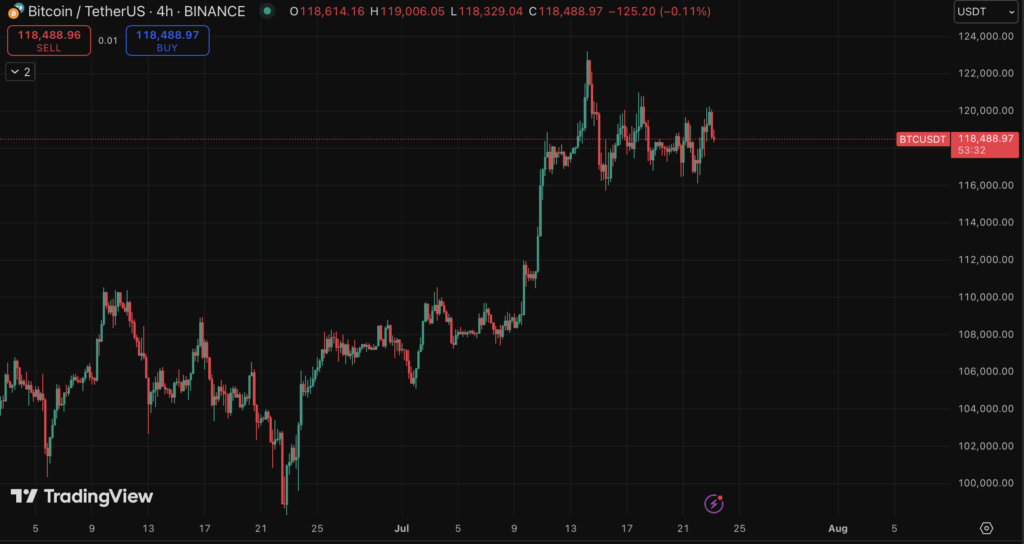UK Might Sell Its Massive Bitcoin Stash to Tackle Budget Crunch

- The UK government is considering selling its $7B Bitcoin reserve, originally seized from a 2018 Ponzi scheme, to help fill a £20B budget gap.
- Critics warn a rushed sale could backfire, suggesting the UK risks missing future gains and hurting its image in the crypto space.
- Any sale would be gradual due to ongoing legal cases and may become a model for other governments managing seized digital assets.
Looks like the UK government might dip into its surprise crypto treasure chest. Chancellor Rachel Reeves is reportedly weighing whether to sell off some—or maybe even all—of the country’s Bitcoin to help ease a growing budget headache.
From Seizure to Strategy
This isn’t Bitcoin the government bought on the sly. It was seized. Way back in 2018, British law enforcement nabbed around 61,000 BTC while cracking down on a massive Chinese Ponzi scheme. At the time, it was worth a few hundred mil. Fast forward to now, with BTC hovering near its peak, and that stash’s value? More than $7 billion. Not exactly chump change.

Filling Gaps Without Raising Taxes
The UK’s facing a roughly £20 billion budget hole—higher debt payments, sluggish growth, all that. Selling Bitcoin might seem like a clever workaround. No new taxes, no public backlash. But there’s a catch: selling now might mean missing out on bigger gains later if Bitcoin keeps rising. And that’s what some folks are nervous about.
Not Everyone’s on Board
Crypto groups like CryptoUK are warning the government to tread lightly. They argue that dumping the BTC could make the UK look short-sighted in the global crypto scene. Other countries—like the U.S., Sweden, and even Bhutan—have opted to hold on to their seized crypto. Sort of like keeping digital gold in the vault. Risky, sure, but possibly worth it in the long haul.

It’s Not a Simple Sell
Selling the Bitcoin isn’t just a “click and cash out” kinda thing. Some of those funds are still tangled up in court cases, with victims looking to get their money back. Until that’s settled, the National Crime Agency and Home Office are babysitting the coins. Only what’s left—if anything—will actually hit the Treasury’s books.
Learning From Missed Opportunities
The U.S. sold thousands of Bitcoin from the Silk Road case years ago—at prices that now look painfully cheap. If they’d waited? They’d be billions richer. That bit of hindsight is fueling the UK’s internal debate about whether to sell now or hang tight.
What’s Next?
The Cabinet Office is working on a plan for how the UK should handle digital assets going forward. Any actual sell-off would probably be slow and methodical, to avoid rattling markets—or stiffing fraud victims.
Whether the UK cashes out or holds on, this decision’s gonna send a message. It could shape how the country’s seen in the world of crypto—and maybe even guide how other governments handle their own Bitcoin stashes down the line.
The post UK Might Sell Its Massive Bitcoin Stash to Tackle Budget Crunch first appeared on BlockNews.
UK Might Sell Its Massive Bitcoin Stash to Tackle Budget Crunch

- The UK government is considering selling its $7B Bitcoin reserve, originally seized from a 2018 Ponzi scheme, to help fill a £20B budget gap.
- Critics warn a rushed sale could backfire, suggesting the UK risks missing future gains and hurting its image in the crypto space.
- Any sale would be gradual due to ongoing legal cases and may become a model for other governments managing seized digital assets.
Looks like the UK government might dip into its surprise crypto treasure chest. Chancellor Rachel Reeves is reportedly weighing whether to sell off some—or maybe even all—of the country’s Bitcoin to help ease a growing budget headache.
From Seizure to Strategy
This isn’t Bitcoin the government bought on the sly. It was seized. Way back in 2018, British law enforcement nabbed around 61,000 BTC while cracking down on a massive Chinese Ponzi scheme. At the time, it was worth a few hundred mil. Fast forward to now, with BTC hovering near its peak, and that stash’s value? More than $7 billion. Not exactly chump change.

Filling Gaps Without Raising Taxes
The UK’s facing a roughly £20 billion budget hole—higher debt payments, sluggish growth, all that. Selling Bitcoin might seem like a clever workaround. No new taxes, no public backlash. But there’s a catch: selling now might mean missing out on bigger gains later if Bitcoin keeps rising. And that’s what some folks are nervous about.
Not Everyone’s on Board
Crypto groups like CryptoUK are warning the government to tread lightly. They argue that dumping the BTC could make the UK look short-sighted in the global crypto scene. Other countries—like the U.S., Sweden, and even Bhutan—have opted to hold on to their seized crypto. Sort of like keeping digital gold in the vault. Risky, sure, but possibly worth it in the long haul.

It’s Not a Simple Sell
Selling the Bitcoin isn’t just a “click and cash out” kinda thing. Some of those funds are still tangled up in court cases, with victims looking to get their money back. Until that’s settled, the National Crime Agency and Home Office are babysitting the coins. Only what’s left—if anything—will actually hit the Treasury’s books.
Learning From Missed Opportunities
The U.S. sold thousands of Bitcoin from the Silk Road case years ago—at prices that now look painfully cheap. If they’d waited? They’d be billions richer. That bit of hindsight is fueling the UK’s internal debate about whether to sell now or hang tight.
What’s Next?
The Cabinet Office is working on a plan for how the UK should handle digital assets going forward. Any actual sell-off would probably be slow and methodical, to avoid rattling markets—or stiffing fraud victims.
Whether the UK cashes out or holds on, this decision’s gonna send a message. It could shape how the country’s seen in the world of crypto—and maybe even guide how other governments handle their own Bitcoin stashes down the line.
The post UK Might Sell Its Massive Bitcoin Stash to Tackle Budget Crunch first appeared on BlockNews.

